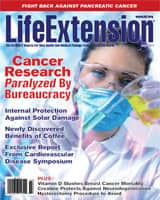Cognitive function improved by B-vitamin supplementation in men and women with elevated homocysteine
Tuesday, July 1, 2014. On June 18, 2014, the journal Nutritional Neuroscience reported the findings of a clinical trial of middle-aged and older men and women who experienced a reduction in homocysteine and better cognition in association with B vitamin supplementation.
The trial included 104 subjects aged 55 to 94 with hyperhomocysteinemia. Participants received 800 micrograms folate, 10 milligrams vitamin B6 and 25 micrograms vitamin B12, or a placebo for 14 weeks. Cognitive aptitude tests and serum analysis of total homocysteine, folate, vitamin B6 and vitamin B12 were conducted before and after treatment.
While folate and vitamin B6 levels remained stable in the control group over the course of the study, vitamin B12 levels declined. Not surprisingly, B vitamin levels improved among those who were supplemented with them. Homocysteine slightly increased in the control group while declining by an average of 3.3 micromoles per liter in those that received B vitamins. Cognitive function significantly improved among those in the vitamin group.
"The cognitive function in the elderly is related to the nutritional status of B vitamins, homocysteine concentrations, and some gene mutations," Daomei Cheng of China's Tianjin Institute of Health and Environmental Medicine and colleagues write. "The proposed mechanisms for the brain injury caused by the deficiency of B vitamins and hyperhomocysteinemia relate to hypomethylation of nucleic acids and neurotransmitters, increased oxidative stress, and increased synthesis of amyloid beta-protein."
"We have observed the homocysteine lowering and cognition improving effects of supplementation containing folate, vitamin B6, and vitamin B12 in the middle-aged and elderly with hyperhomocysteinemia," they conclude. "We recommend that all elderly should take B vitamin supplements regularly if the blood test results indicate that the homocysteine concentrations are abnormal." |
 |
What's Hot
An article published online on August 5, 2013 in the Journal of Affective Disorders reports an association between higher levels of plasma homocysteine and an increased risk of cognitive impairment in older adults.
Researchers from the University of Western Australia and Royal Perth Hospital recruited 358 individuals aged 50 and older with depressive symptoms, among whom 70% met the criteria for major depression. Fasting blood samples were analyzed for total plasma homocysteine, serum vitamin B12 and red blood cell folate levels. Cognitive tests administered included the Mini-mental state examination and tests of verbal fluency, naming, word list immediate recall, word list delayed recall and drawing (visual) recall.
Seventy-one participants had high homocysteine levels, defined in this study as 13 micromoles per liter or more. In subjects with and without major depression, those with higher homocysteine levels had lower median folate and vitamin B12 levels. "The results of this cross-sectional study show that in this sample of older adults, elevated total homocysteine was associated with weaker performance in tests of immediate and delayed memory and global cognitive performance when compared to those with normal total homocysteine," authors Andrew H. Ford and his colleagues report.
"The finding that high total homocysteine is associated with cognitive inefficiency in later life independent of depressive status has potential public health implications," they note. "Homocysteine can be reliably lowered by around by daily supplementation with vitamin B12 and folic acid, making it a potential modifiable risk factor for cognitive impairment in depressed older adults."
"Homocysteine lowering B-vitamin supplementation may offer a potential therapeutic target to try and mitigate the often-disabling impact of cognitive deficits found in this population," they conclude. |
 |
Highlight
Life Extension Magazine® July 2014 e-Issue Now Online

Health Headlines
As we see it: Intolerable delays, by William Faloon
Protect against sun-induced skin aging from the inside out, by Michael Downey
Creatine reduces markers of aging, by Will Brink
New health benefits from daily coffee, by Jeffrey Huntington
The 2014 Cardiovascular Disease Prevention Symposium, by Ben Best
When a common gynecological procedure turns deadly, by Drew Hofmann
Departments
In the news, by D. Dye and A. Kessler
Wellness profile: Jean Braure, by Jon Finkel
Super Foods: Harness the nutritional power of hemp seeds, by William Gamonski
Author interview: What went wrong? By Nicholas J. Gonzales, MD |

|
Latest Products |
 |
|
For coffee lovers who like to freshly grind their own coffee beans, Rich Rewards® Breakfast Blend Whole Bean Coffee is made using a patented, 100% natural process called HealthyRoast®. This process delivers a more complete nutritional profile of the coffee bean, yielding up to 87% more chlorogenic acid than conventional coffees.
Handpicked deep in the rainforests of Central America, Rich Rewards® consists exclusively of 100% USDA certified organic arabica coffee beans, gently roasted in small batches—with the polyphenols then added back in to provide optimal health benefits.
We also offer Rich Rewards® Breakfast Blend Ground Coffee—so you can kick-start your day a little faster—in both caffeinated and decaffeinated options.
HealthyRoast® US Patent Nos. 6,723,368; 8,357,419. |
| |
 |
|
Cytokine Suppress™ with EGCG provides two natural food ingredients long used in traditional Asian cuisine and medicine that have the ability to promote a healthy inflammatory immune response. Key constituents found in mung beans and green tea support the natural process of the immune system's inflammatory activity. This potent benefit is delivered by the novel flavonoids and other molecules found primarily in the seed coat of the mung bean, and the compound EGCG (epigallocatechin-3-gallate), the major beneficial component in green tea.
Acting together, these mung bean and green tea compounds help regulate levels, among those within the normal range, of a protein molecule known as HMGB1. This molecule is responsible for controlling the signaling compounds known as cytokines that generate inflammation.
|
|
 |
Related Articles
|
|












